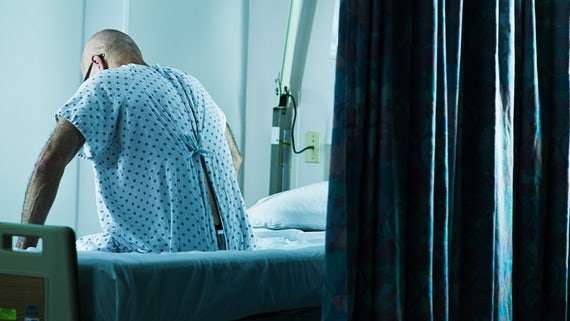Improvements needed in hospital care of people living with dementia

Nurses and healthcare workers are highly concerned about vulnerable patients who make up the equivalent of 3.2 million hospital beds per year, according to a new report by Cardiff University.
The first three-year in-depth ethnographic investigation across England and Wales looks into the care that people living with dementia receive when they are admitted to hospitals with another acute condition and describes a desperate ward landscape of dehumanisation, staff burnout and a setting that does not meet the needs of this growing NHS challenge.
People with an acute condition, who also have dementia, occupy between 25-50% of all NHS hospital beds.
Recommendations from the study suggest stark changes to ward organisation, interventions and training, and care delivered at each bedside if the NHS is to respond to the needs of the growing patient population.
The team found that requirements of targets, risk assessments, and the strict ward routines and timetables of bedside care are currently dominating the everyday work of ward staff, preventing them from delivering the bedside care that people living with dementia require. The fallout from this is a self-perpetuating cycle of anxiety for patients living with dementia, the consequences of which are delivering significant emotional toll on staff.
The recommendations from the research include no-cost and low cost solutions that can be easily integrated into existing ward organization and nursing care at the bedside.
The report also found that a dementia diagnosis overshadowed and dominated care, impacting on decisions relating to treatment and discharge pathways.
Dr. Katie Featherstone and her team from Cardiff University, funded by the NIHR, have identified high levels of resistance to care amongst people living with dementia. At some point during their admission, every person observed during the investigation resisted care. Resistance originated from difficulties they had in communicating their needs, anxiety and disorientation. Indications suggest that these responses came from the way care was organized and delivered at their bedside.
"Such high and consistent levels of patient resistance and rejection of care and treatment has led to our controversial conclusion that the current ward styles of delivering care is counter-productive and overshadowing the individual needs of sensitive patients who struggle to express their needs. It is also detrimental to ward staff, who are not supported or provided with the skills to care for them", says Dr. Featherstone.
One of the key ward responses to resistance to care was containment and restraint of people living with dementia – in place of best-practice recommendations for person-centred care and the need for frail and elderly patients to be allowed to move around to facilitate rehabilitation.
Hospital Trusts have an increasing culture of outsourcing dementia care to agency staff who are not trained in the care of people living with dementia, or to a small team of specialist 'dementia workers', whose expertise is stretched across a large hospital population. This meant that having expertise in caring for people living with dementia was typically viewed by ward staff as 'other people's work'.
The report is calling for a re-positioning in the culture of outsourcing dementia care with an increased focus on improving training and the development of ward organisation and bedside care that supports both people living with dementia and ward staff.


















